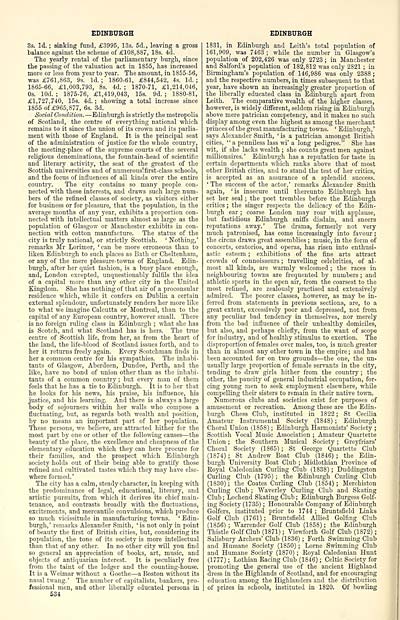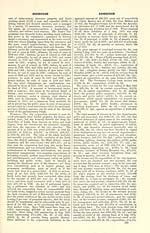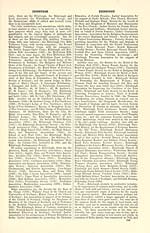Ordnance gazetteer of Scotland > Volume 2
(282) Page 534
Download files
Complete book:
Individual page:
Thumbnail gallery: Grid view | List view

EDINBURGH
3s. Id. ; sinking fund, £3995, 13s. 5d., leaving a gross
balance against the scheme of £108,887, 18s. 4d.
The yearly rental of the parliamentary burgh, since
the passing of the valuation act in 1855, has increased
more or less from year to year. The amount, in 1855-56,
was £761,863, 9s. Id. ; 1860-61, £844,542, 4s. Id. ;
1865-66, £1,003,793, 8s. 4d. ; 1870-71, £1,214,046,
0s. lOd. ; 1875-76, £1,419,043, 15s. 9d. ; 1880-81,
£1,727,740, 15s. 4d. ; showing a total increase since
1855 of £965,877, 6s. 3d.
Social Condition. — Edinburgh is strictly the metropolis
of Scotland, the centre of everything national which
remains to it since the union of its crown and its parlia-
ment with those of England. It is the principal seat
of the administration of justice for the whole country,
the meeting-place of the supreme courts of the several
religious denominations, the fountain-head of scientific
and literary activity, the seat of the greatest of the
Scottish universities and of numerous!first-class schools,
and the focus of influences of all kinds over the entire
country. The city contains so many people con-
nected with these interests, and draws such large num-
bers of the refined classes of society, as visitors either
for business or for pleasure, that the population, in the
average months of any year, exhibits a proportion con-
nected with intellectual matters almost as large as the
population of Glasgow or Manchester exhibits in con-
nection with cotton manufacture. The status of the
city is truly national, or strictly Scottish. ' Nothing,'
remarks Mr Lorimer, ' can be more erroneous than to
liken Edinburgh to such places as Bath or Cheltenham,
or any of the mere pleasure-towns of England. Edin-
burgh, after her quiet fashion, is a busy place enough,
and, London excepted, unquestionably fulfils the idea
of a capital more than any other city in the United
Kingdom. She has nothing of that air of a proconsular
residence which, while it confers on Dublin a certain
external splendour, unfortunately renders her more like
to what we imagine Calcutta or Montreal, than to the
capital of any European country, however small. There
is no foreign ruling class in Edinburgh ; what she has
is Scotch, and what Scotland has is hers. The true
centre of Scottish life, from her, as from the heart of
the land, the life-blood of Scotland issues forth, and to
her it returns freely again. Every Scotchman finds in
her a common centre for his sympathies. The inhabi-
tants of Glasgow, Aberdeen, Dundee, Perth, and the
like, have no bond of union other than as the inhabi-
tants of a common country ; but ever} 7 man of them
feels that he has a tie to Edinburgh. It is to her that
he looks for his news, his praise, his influence, his
justice, and his learning. And there is always a large
body of sojourners within her walls who compose a
fluctuating, but, as regards both wealth and position,
by no means an important part of her population.
These persons, we believe, are attracted hither for the
most part by one or other of the following causes — the
beauty of the place, the excellence and cheapness of the
elementary education which they can here procure for
their families, and the prospect which Edinburgh
society holds out of their being able to gratify those
refined and cultivated tastes which they may have else-
where formed.'
The city has a calm, steady character, in keeping with
the predominance of legal, educational, literary, and
artistic pursuits, from which it derives its chief main-
tenance, and contrasts broadly with the fluctuations,
excitements, and mercantile convulsions, which produce
so much vicissitude in manufacturing towns. ' Edin-
burgh,' remarks Alexander Smith, 'is not only in point
of beauty the first of British cities, but, considering its
population, the tone of its society is more intellectual
than that of any other. In no other city will you find
so general an appreciation of books, art, music, and
objects of antiquarian interest. It is peculiarly free
from the taint of the ledger and the counting-house.
It is a Weimar without a Goethe — a Boston without its
nasal twang. ' The number of capitalists, bankers, pro-
fessional men, and other liberally educated persons in
534
EDINBURGH
1831, in Edinburgh and Leith's total population of
161,909, was 7463 ; while the number in Glasgow's
population of 202,426 was only 2723 ; in Manchester
and Salford's population of 182,812 was only 2821 ; in
Birmingham's population of 146,986 was only 2388 ;
and the respective numbers, in times subsequent to that
year, have shown an increasingly greater proportion of
the liberally educated class in Edinburgh apart from
Leith. The comparative wealth of the higher classes,
however, is widely different, seldom rising in Edinburgh
above mere patrician competency, and it makes no such
display among even the highest as among the merchant
princes of the great manufacturing towns. ' Edinburgh,'
says Alexander Smith, ' is a patrician amongst British
cities, "a penniless lass wi' a long pedigree." She has
wit, if she lacks wealth ; she counts great men against
millionaires.' Edinburgh has a reputation for taste in
certain departments which ranks above that of most
other British cities, and to stand the test of her critics,
is accepted as an assurance of a splendid success.
' The success of the actor,' remarks Alexander Smith
again, 'is insecure until thereunto Edinburgh has
set her seal ; the poet trembles before the Edinburgh
critics ; the singer respects the delicacy of the Edin-
burgh ear ; coarse London may roar with applause,
but fastidious Edinburgh sniffs disdain, and sneers
reputations away.' The drama, formerly not very
much patronised, has come increasingly into favour ;
the circus draws great assemblies ; music, in the form of
concerts, oratorios, and operas, has risen into enthusi-
astic esteem ; exhibitions of the fine arts attract
crowds of connoisseurs ; travelling celebrities, of al-
most all kinds, are warmly welcomed ; the races in
neighbouring towns are frequented by numbers ; and
athletic sports in the open air, from the coarsest to the
most refined, are zealously practised and extensively
admired. The poorer classes, however, as may be in-
ferred from statements in previous sections, are, to a
great extent, excessively poor and depressed, not from
any peculiar bad tendency in themselves, nor merely
from the bad influence of their unhealthy domiciles,
but also, and perhaps chiefly, from the want of scope
for industry, and of healthy stimulus to exertion. The
disproportion of females over males, too, is much greater
than in almost any other town in the empire ; and has
been accounted for on two grounds — the one, the un-
usually large proportion of female servants in the city,
tending to draw girls hither from the country ; the
other, the paucity of general industrial occupation, for-
cing young men to seek employment elsewhere, while
compelling their sisters to remain in their native town.
Numerous clubs and societies exist for purposes of
amusement or recreation. Among these are the Edin-
burgh Chess Club, instituted in 1822 ; St Cecilia
Amateur Instrumental Society (1848) ; Edinburgh
Choral Union (1S58) ; Edinburgh Harmonists' Society ;
Scottish Vocal Music Association ; Amateur Quartette
Union ; the Southern Musical Society ; Greyfriars'
Choral Society (1865) ; St George Quartette Club
(1874) ; St Andrew Boat Club (1846) ; the Edin-
burgh University Boat Club ; Midlothian Province of
Royal Caledonian Curling Club (1S38) ; Duddingston
Curling Club (1795) ; the Edinburgh Curling "Club
(1830); the Coates Curling Club (1854); Merchiston
Curling Club ; "Waverley Curling Club and Skating
Club ; Lochend Skating Club ; Edinburgh Burgess Golf-
ing Society (1735) ; Honourable Company of Edinburgh
Golfers, instituted prior to 1744 ; Bruntsfield Links
Golf Club (1761) ; Bruntsfield Allied Golfing Club
(1856) ; TVarrender Golf Club (1858); the Edinburgh
Thistle Golf Club (1871) ; Viewforth Golf Club (1872) ;
Salisbury Archers' Club (1836) ; Forth Swimming Club
and Humane Society (1850) ; Lome Swimming Club
and Humane Society (1870) ; Royal Caledonian Hunt
(1777) ; Lothian Racing Club (1846) ; Celtic Society for
promoting the general use of the ancient Highland
dress in the Highlands of Scotland, and for encouraging
education among the Highlanders and the distribution
of prizes in schools, instituted in 1820. Of bowling
3s. Id. ; sinking fund, £3995, 13s. 5d., leaving a gross
balance against the scheme of £108,887, 18s. 4d.
The yearly rental of the parliamentary burgh, since
the passing of the valuation act in 1855, has increased
more or less from year to year. The amount, in 1855-56,
was £761,863, 9s. Id. ; 1860-61, £844,542, 4s. Id. ;
1865-66, £1,003,793, 8s. 4d. ; 1870-71, £1,214,046,
0s. lOd. ; 1875-76, £1,419,043, 15s. 9d. ; 1880-81,
£1,727,740, 15s. 4d. ; showing a total increase since
1855 of £965,877, 6s. 3d.
Social Condition. — Edinburgh is strictly the metropolis
of Scotland, the centre of everything national which
remains to it since the union of its crown and its parlia-
ment with those of England. It is the principal seat
of the administration of justice for the whole country,
the meeting-place of the supreme courts of the several
religious denominations, the fountain-head of scientific
and literary activity, the seat of the greatest of the
Scottish universities and of numerous!first-class schools,
and the focus of influences of all kinds over the entire
country. The city contains so many people con-
nected with these interests, and draws such large num-
bers of the refined classes of society, as visitors either
for business or for pleasure, that the population, in the
average months of any year, exhibits a proportion con-
nected with intellectual matters almost as large as the
population of Glasgow or Manchester exhibits in con-
nection with cotton manufacture. The status of the
city is truly national, or strictly Scottish. ' Nothing,'
remarks Mr Lorimer, ' can be more erroneous than to
liken Edinburgh to such places as Bath or Cheltenham,
or any of the mere pleasure-towns of England. Edin-
burgh, after her quiet fashion, is a busy place enough,
and, London excepted, unquestionably fulfils the idea
of a capital more than any other city in the United
Kingdom. She has nothing of that air of a proconsular
residence which, while it confers on Dublin a certain
external splendour, unfortunately renders her more like
to what we imagine Calcutta or Montreal, than to the
capital of any European country, however small. There
is no foreign ruling class in Edinburgh ; what she has
is Scotch, and what Scotland has is hers. The true
centre of Scottish life, from her, as from the heart of
the land, the life-blood of Scotland issues forth, and to
her it returns freely again. Every Scotchman finds in
her a common centre for his sympathies. The inhabi-
tants of Glasgow, Aberdeen, Dundee, Perth, and the
like, have no bond of union other than as the inhabi-
tants of a common country ; but ever} 7 man of them
feels that he has a tie to Edinburgh. It is to her that
he looks for his news, his praise, his influence, his
justice, and his learning. And there is always a large
body of sojourners within her walls who compose a
fluctuating, but, as regards both wealth and position,
by no means an important part of her population.
These persons, we believe, are attracted hither for the
most part by one or other of the following causes — the
beauty of the place, the excellence and cheapness of the
elementary education which they can here procure for
their families, and the prospect which Edinburgh
society holds out of their being able to gratify those
refined and cultivated tastes which they may have else-
where formed.'
The city has a calm, steady character, in keeping with
the predominance of legal, educational, literary, and
artistic pursuits, from which it derives its chief main-
tenance, and contrasts broadly with the fluctuations,
excitements, and mercantile convulsions, which produce
so much vicissitude in manufacturing towns. ' Edin-
burgh,' remarks Alexander Smith, 'is not only in point
of beauty the first of British cities, but, considering its
population, the tone of its society is more intellectual
than that of any other. In no other city will you find
so general an appreciation of books, art, music, and
objects of antiquarian interest. It is peculiarly free
from the taint of the ledger and the counting-house.
It is a Weimar without a Goethe — a Boston without its
nasal twang. ' The number of capitalists, bankers, pro-
fessional men, and other liberally educated persons in
534
EDINBURGH
1831, in Edinburgh and Leith's total population of
161,909, was 7463 ; while the number in Glasgow's
population of 202,426 was only 2723 ; in Manchester
and Salford's population of 182,812 was only 2821 ; in
Birmingham's population of 146,986 was only 2388 ;
and the respective numbers, in times subsequent to that
year, have shown an increasingly greater proportion of
the liberally educated class in Edinburgh apart from
Leith. The comparative wealth of the higher classes,
however, is widely different, seldom rising in Edinburgh
above mere patrician competency, and it makes no such
display among even the highest as among the merchant
princes of the great manufacturing towns. ' Edinburgh,'
says Alexander Smith, ' is a patrician amongst British
cities, "a penniless lass wi' a long pedigree." She has
wit, if she lacks wealth ; she counts great men against
millionaires.' Edinburgh has a reputation for taste in
certain departments which ranks above that of most
other British cities, and to stand the test of her critics,
is accepted as an assurance of a splendid success.
' The success of the actor,' remarks Alexander Smith
again, 'is insecure until thereunto Edinburgh has
set her seal ; the poet trembles before the Edinburgh
critics ; the singer respects the delicacy of the Edin-
burgh ear ; coarse London may roar with applause,
but fastidious Edinburgh sniffs disdain, and sneers
reputations away.' The drama, formerly not very
much patronised, has come increasingly into favour ;
the circus draws great assemblies ; music, in the form of
concerts, oratorios, and operas, has risen into enthusi-
astic esteem ; exhibitions of the fine arts attract
crowds of connoisseurs ; travelling celebrities, of al-
most all kinds, are warmly welcomed ; the races in
neighbouring towns are frequented by numbers ; and
athletic sports in the open air, from the coarsest to the
most refined, are zealously practised and extensively
admired. The poorer classes, however, as may be in-
ferred from statements in previous sections, are, to a
great extent, excessively poor and depressed, not from
any peculiar bad tendency in themselves, nor merely
from the bad influence of their unhealthy domiciles,
but also, and perhaps chiefly, from the want of scope
for industry, and of healthy stimulus to exertion. The
disproportion of females over males, too, is much greater
than in almost any other town in the empire ; and has
been accounted for on two grounds — the one, the un-
usually large proportion of female servants in the city,
tending to draw girls hither from the country ; the
other, the paucity of general industrial occupation, for-
cing young men to seek employment elsewhere, while
compelling their sisters to remain in their native town.
Numerous clubs and societies exist for purposes of
amusement or recreation. Among these are the Edin-
burgh Chess Club, instituted in 1822 ; St Cecilia
Amateur Instrumental Society (1848) ; Edinburgh
Choral Union (1S58) ; Edinburgh Harmonists' Society ;
Scottish Vocal Music Association ; Amateur Quartette
Union ; the Southern Musical Society ; Greyfriars'
Choral Society (1865) ; St George Quartette Club
(1874) ; St Andrew Boat Club (1846) ; the Edin-
burgh University Boat Club ; Midlothian Province of
Royal Caledonian Curling Club (1S38) ; Duddingston
Curling Club (1795) ; the Edinburgh Curling "Club
(1830); the Coates Curling Club (1854); Merchiston
Curling Club ; "Waverley Curling Club and Skating
Club ; Lochend Skating Club ; Edinburgh Burgess Golf-
ing Society (1735) ; Honourable Company of Edinburgh
Golfers, instituted prior to 1744 ; Bruntsfield Links
Golf Club (1761) ; Bruntsfield Allied Golfing Club
(1856) ; TVarrender Golf Club (1858); the Edinburgh
Thistle Golf Club (1871) ; Viewforth Golf Club (1872) ;
Salisbury Archers' Club (1836) ; Forth Swimming Club
and Humane Society (1850) ; Lome Swimming Club
and Humane Society (1870) ; Royal Caledonian Hunt
(1777) ; Lothian Racing Club (1846) ; Celtic Society for
promoting the general use of the ancient Highland
dress in the Highlands of Scotland, and for encouraging
education among the Highlanders and the distribution
of prizes in schools, instituted in 1820. Of bowling
Set display mode to: Large image | Transcription
Images and transcriptions on this page, including medium image downloads, may be used under the Creative Commons Attribution 4.0 International Licence unless otherwise stated. ![]()
| Gazetteers of Scotland, 1803-1901 > Ordnance gazetteer of Scotland > Volume 2 > (282) Page 534 |
|---|
| Permanent URL | https://digital.nls.uk/97376162 |
|---|
| Attribution and copyright: |
|
|---|---|

